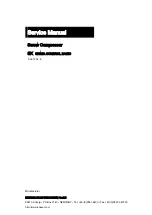
Maintenance instructions
27/38
0175-168 - ENG
Rev. 2005.09
Operating Manual - SAB 202
Maintenance instructions
Maintenance of the compressor unit
General
To ensure that the compressor unit operates with-
out problems throughout a long service life, the
system of maintenance presented in the following
instructions must be followed.
Maintenance can be divided into 3 groups:
1.
Daily maintenance
Daily maintenance consists of visual inspec-
tions. When familiar with the normal noise
and vibration of the unit, compare each
day's performance with previous observa-
tions. Make comparisons with the available
diagrams etc. to make certain that the oper-
ating data lie within the permissible ranges.
•
Inspect the compressor unit and check
that both noise and vibration are normal.
•
Enter the observed operating data into
the operations log, see the table
Moni-
toring the operation
. Check that all oper-
ating values are within the permissible
ranges. Compare them with previous
values to detect trends. If necessary,
submit a report so that a closer check
can be made.
•
Check the oil level in the oil separator
(Screw compressor unit).
•
Check the oil level in the compressor
(Reciprocating compressor unit).
•
Check the oil pressure.
•
Check the refrigerant charge.
•
Search for leaks if there is even the
slightest suspicion that there may be a
leak. Conducting a manual check right at
the compressor unit itself is always the
best way to check for:
a) leakage of oil and/or refrigerant,
b) leakage of cooling water or brine,
c) abnormal vibrations.
•
Do not wait for the monitoring equipment
to issue an alarm. Searching for leaks is
explained in greater detail later in this
section.
W
Warning!
Daily maintenance is normally conducted by oper-
ating personnel. Other maintenance and service
tasks which require the refrigeration system to be
opened must only be conducted by authorised
personnel.
2.
Periodic maintenance
Motor lubrication and other routine mainte-
nance tasks are usually based on running
time. Note, however, that these can be con-
ducted more frequently if necessary.
3.
Major overhaul
For major maintenance tasks such as com-
pressor overhauls, the usual procedure is to
call in the supplier's service personnel.












































